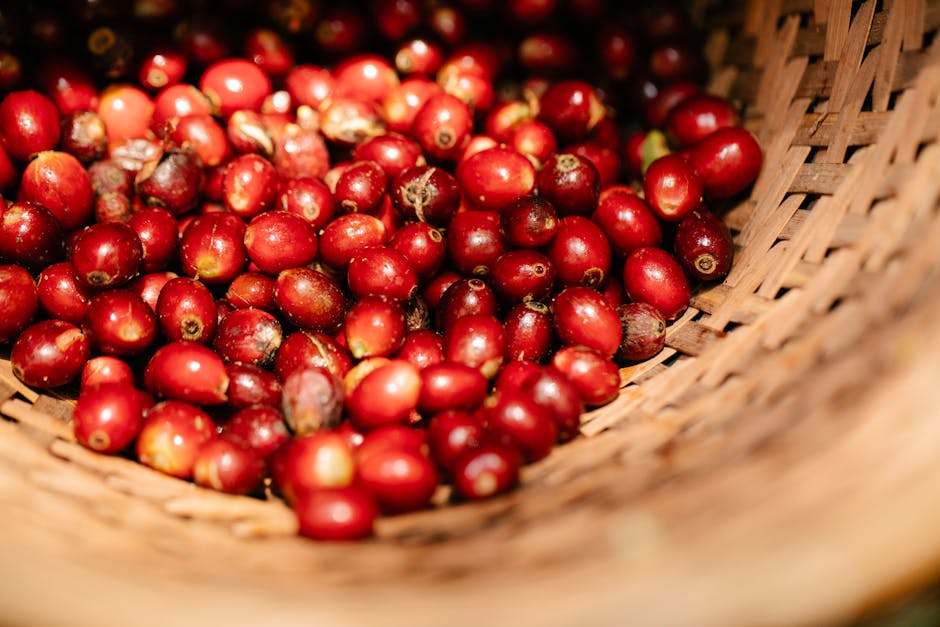Forget about fancy wine tastings or gourmet cheese samplings – the true key to unlocking a world of rich and robust flavors lies in a humble cup of Costa Rican coffee. From the bustling streets of San Jose to the tranquil plantations of the Central Valley, the magic of this caffeinated elixir lies in its diverse array of flavors and aromas. So grab your favorite mug and get ready to embark on a tantalizing journey through the vibrant and bold flavors of Costa Rican coffee.
Contents
Exploring the Rich History of Costa Rican Coffee
Costa Rica is a country known for its stunning landscapes, abundant wildlife, and of course, its delicious coffee. But did you know that the history of coffee in Costa Rica dates back to the early 19th century? That’s right, coffee has been an essential part of Costa Rican culture for over 200 years!
With its ideal climate and fertile soil, Costa Rica quickly became a hotspot for coffee production, and it wasn’t long before the rest of the world caught on to the magic of Costa Rican coffee. Today, Costa Rican coffee is known for its rich flavor, bright acidity, and smooth finish – a true delight for coffee connoisseurs everywhere.
One of the most fascinating aspects of Costa Rican coffee history is the role of the cafetales, or coffee plantations, which have been passed down through generations of Costa Rican families. These cafetales are not just farms – they are living museums, preserving the traditions and techniques of coffee production that have been honed over centuries.
So the next time you pour yourself a steaming cup of Costa Rican coffee, take a moment to savor the rich history and culture that goes into every sip. And remember, when it comes to coffee, Costa Rica truly is a brew-tiful country!
The Diversity of Costa Rican Coffee Regions
Costa Rica is a tiny country, but when it comes to coffee, it’s a giant! The diversity of coffee regions in Costa Rica is truly mind-boggling. From the lush mountains of Alajuela to the sandy beaches of Guanacaste, each region has its own unique flavor profile that will make your taste buds sing with joy.
So, what makes Costa Rican coffee so special? Well, for starters, it’s all about the altitude. The higher the coffee plants are grown, the better the beans. That’s why you’ll find some of the best coffee in the world coming from regions like Tarrazú and Naranjo, where the altitude is sky-high and the flavors are out of this world.
But that’s not all – Costa Rican coffee is also known for its rich volcanic soil, which gives the beans a distinctively deep and complex flavor. Add to that the perfect combination of sunshine, rain, and cool mountain breezes, and you’ve got yourself a winning formula for some seriously delicious coffee.
So, the next time you take a sip of that steaming cup of Costa Rican java, remember – you’re not just drinking coffee, you’re experiencing a taste of the diverse and vibrant coffee regions that make Costa Rica so special. And hey, if you ever get the chance to visit one of these regions in person, be sure to take a tour of a local coffee farm and see for yourself where all the magic happens. Trust me, your taste buds will thank you!

Processing Methods: From Cherry to Cup
So you’re curious about what happens to those coffee cherries before they end up in your cup, eh? Well, let me spill the beans – pun intended!
First off, the cherries are harvested by either hand-picking or strip-picking, depending on the region and the type of coffee. Once they’re plucked from the tree, they’re ready to undergo the magical transformation that turns them into that glorious elixir we all know and love.
The processing methods differ based on the desired flavor profile and the region, but a few common techniques include:
- Washed Process: The cherries are pulped to remove the fruit, then fermented and washed to remove any remaining pulp.
- Natural Process: The cherries are dried with the fruit still intact, giving the beans a unique fruity flavor.
- Honey Process: The cherries are partially pulped, leaving some of the fruit attached to the beans during drying.
These various methods all contribute to the final taste of your cup of joe. So next time you take a sip, just remember – it’s not just coffee, it’s a bean through a beautiful journey from cherry to cup!

Tasting Notes: Understanding the Flavor Profiles
So you’ve finally decided to take the plunge into the world of wine tasting. As you swirl your glass and take a sip, you’re hit with a whirlwind of flavors that you can’t quite put your finger on. Fear not, dear reader, for I am here to guide you through the labyrinth of taste sensations.
First up, let’s talk about the basics. When it comes to wine tasting, there are three main flavor profiles to consider: sweetness, acidity, and tannins. These elements work in harmony to create a balanced and complex wine-drinking experience. Just like a well-oiled machine, each component plays a crucial role in the overall flavor profile.
Now, let’s delve a little deeper into the world of tasting notes. When you take a sip of wine, pay attention to the different flavors that dance across your palate. Is it fruity or floral? Does it have hints of vanilla or spice? Make sure to jot down your observations so you can refer back to them later.
Lastly, don’t be afraid to trust your own instincts when it comes to tasting wine. Everyone’s palate is different, so what one person tastes may not be the same as what you taste. Embrace the journey of discovery and enjoy the ride!

The Impact of Sustainable Practices on Costa Rican Coffee
Costa Rican coffee is renowned for its high quality and unique flavor profile. However, the impact of sustainable practices on the production of this beloved beverage cannot be overstated.
By implementing sustainable practices such as organic farming methods and water conservation techniques, Costa Rican coffee farmers are not only preserving the environment, but also ensuring the long-term viability of their crops. This means that coffee lovers around the world can continue to enjoy their daily cup of joe without worrying about the negative effects of traditional farming practices.
Furthermore, sustainable practices help to support the local community by creating jobs and promoting economic growth. By purchasing sustainably produced Costa Rican coffee, consumers can feel good knowing that they are supporting a product that is not only delicious, but also beneficial to the environment and the people who grow it.
So next time you’re sipping on a delicious cup of Costa Rican coffee, take a moment to appreciate the impact of sustainable practices on the production of this magical bean. Remember, by choosing sustainable coffee, you’re not just enjoying a great cup of coffee – you’re also helping to make the world a better place, one sip at a time.
Embracing the Culture of Coffee in Costa Rica
Costa Rica is famous for its stunning nature and delicious coffee. When visiting this beautiful country, it’s essential to embrace the rich coffee culture that permeates daily life.
One of the best ways to immerse yourself in the world of Costa Rican coffee is to visit a traditional coffee plantation. Feel the excitement as you walk through rows of coffee plants, each one lovingly tended by local farmers. Learn about the entire coffee-making process, from planting to roasting to brewing. And of course, don’t forget to sample some of the best coffee you’ve ever tasted!
Costa Ricans take their coffee very seriously, so be prepared to drink a lot of it. From the moment you wake up to the last cup before bed, coffee is an integral part of daily life in Costa Rica. Join locals at bustling cafes, where you can sip your favorite brew while chatting with friendly baristas and fellow coffee enthusiasts.
isn’t just about the drink itself. It’s about slowing down, savoring the moment, and enjoying the simple pleasures in life. So grab a cup of rich, bold Costa Rican coffee and let yourself be transported to a world where every sip is a celebration of flavor and tradition.
FAQs
Why is Costa Rican coffee considered some of the best in the world?
Well, my friend, it all comes down to the unique climate and topography of Costa Rica. The combination of high altitudes, rich volcanic soil, and just the right amount of rainfall creates the perfect conditions for growing delicious coffee beans with complex flavors.
What is the most popular coffee variety in Costa Rica?
Ah, the beloved Costa Rican Tarrazú coffee reigns supreme in the hearts of coffee lovers around the world. Known for its bright acidity, full body, and fruity notes, this variety is like a tropical vacation in a cup.
How can I bring out the best flavors in Costa Rican coffee?
Listen up, coffee aficionados! To truly unlock the flavors of Costa Rican coffee, make sure to brew it using the pour-over method. This slow and controlled process allows the intricate flavors to shine through, giving you a cup of coffee that’s worth savoring.
What food pairings complement the flavors of Costa Rican coffee?
When it comes to pairing Costa Rican coffee with food, think tropical flavors. Fresh fruits like pineapple or mango, buttery pastries, and decadent chocolates are the perfect companions to enhance the rich and vibrant notes of your coffee.
Is there a secret to enjoying Costa Rican coffee like a true Tico?
Ah, my friend, the true secret to enjoying Costa Rican coffee like a local is to savor it slowly. Take your time to appreciate the flavors, aromas, and the experience of each sip. Costa Ricans believe that coffee is meant to be enjoyed, not rushed. So sit back, relax, and let the bold flavors transport you to the lush coffee plantations of Costa Rica.
—
Bottoms Up!
So there you have it, folks. Costa Rican coffee is a whole world of flavors just waiting to be unlocked and savored. From the citrusy notes of Tarrazu to the chocolatey richness of Tres Rios, there’s a cup of Joe for every palate.
So grab your favorite mug, brew up a pot of Costa Rican goodness, and savor the delicious flavors that this tiny country has to offer. And remember, when it comes to coffee, the key to unlocking its full potential is just a sip away. Cheers!




